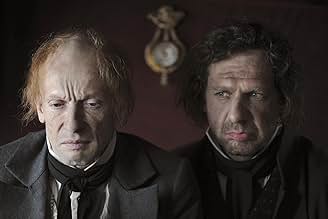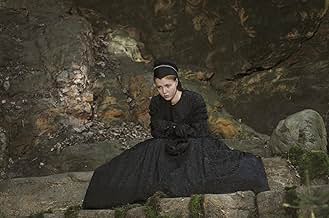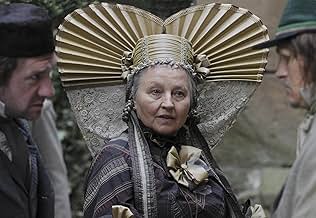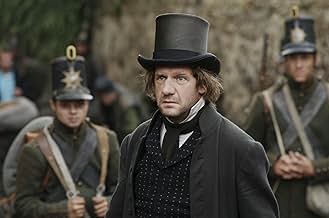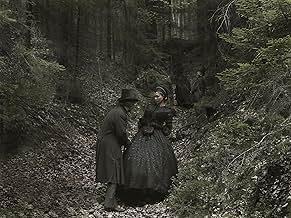IMDb RATING
6.5/10
5.9K
YOUR RATING
A despairing scholar sells his soul to Satan in exchange for one night with a beautiful young woman.A despairing scholar sells his soul to Satan in exchange for one night with a beautiful young woman.A despairing scholar sells his soul to Satan in exchange for one night with a beautiful young woman.
- Awards
- 15 wins & 27 nominations total
Eva-Maria Kurz
- Faust's Cook
- (as Eva Kurz)
Featured reviews
It begins with the evisceration of a corpse, and that could be a metaphor for the way this alleged adaptation proceeds - except that Goethe's "Faust" is not dead, only given the dead-letter treatment here. The film's emphasis is on gross, clumsy physicality: you never saw so many actors stumble as they walk, bumping into things and one another; too artless and unfunny for slapstick, the universal jostling is prevented from being laughable by funereal pacing and the array of hangdog faces. Since the Faust figure (Johannes Zeiler) conveys very little in the way of intellect, all that elevates him is that most of the other characters have been made open-mouthed gapers, presumable halfwits. Wit is barred out anyway by the color-palette, all various hues of mud - the surest sign of high-serious intentions in movies nowadays. In exterior shots the sky is overexposed so it shows as a gleamless white blur; the earth is dun-colored, greens are gray-tinged, and reds are virtually absent, on their rare appearance tending to brown, like bloodstained linens oxidizing. The cut of the men's clothing updates the story to several decades after Goethe's time: trousers are worn, rather than breeches and hose. The fabrics are thick, heavy, coarse, and of course dark-dyed and fraying badly. No one could think of playing the dandy here. Strangely, there seems to be no Republic of Letters either. The few characters with intellectual interests neither write nor receive letters; they're isolated from enlightenment and worldly affairs: no one awaits the postman; no one looks at a journal of science or politics or the arts - this is a stupefying omission, as false to the historical period as it would be to Goethe's own. Sokurov's flight from historical particulars strands his Faust: the fable and the character become "timeless" in all the wrong ways. Faust doesn't represent his age's high hopes, or its seeds of self-destruction; but then he doesn't represent our age either. Sealed off in its remoteness, Sokurov's "Faust" is just another - all-too-familiar - sulking, glooming art-house reverie.
Aleksandr Sokurov's take at Faust is a courageous act. Yet, my issues with this movie have nothing to do with the discussion whether a Russian director might understand the essence of Goethe's work. This is a futile debate, because Sokurov comes closer to Goethe than an average Westerner to Russian classics, as displayed in Joe Wright's Anna Karenina (2011).
In Faust, Sokurov did what he's done before. There are rather realistic, almost documentary images and there are dream-like sequences. We've seen the former in, for example, the trilogy of Moloch (1999), Taurus (2001) and The Sun (2005). And we've seen the latter in, for example, Russian Ark (2002) and Alexandra (2007). So what went wrong?
Again, i'm expressing my views here and won't try to judge Sokurov's talents and abilities. In Faust we kick off with the daily work of Dr. Faust and progress toward the space beyond reality. Whether it is a higher plane of existence or main character's hallucination is left unclear, yet it portrays well his inner state, triggered by malnutrition and selling the soul. Personally, at a certain point i found this movie difficult to watch...
In Faust, Sokurov did what he's done before. There are rather realistic, almost documentary images and there are dream-like sequences. We've seen the former in, for example, the trilogy of Moloch (1999), Taurus (2001) and The Sun (2005). And we've seen the latter in, for example, Russian Ark (2002) and Alexandra (2007). So what went wrong?
Again, i'm expressing my views here and won't try to judge Sokurov's talents and abilities. In Faust we kick off with the daily work of Dr. Faust and progress toward the space beyond reality. Whether it is a higher plane of existence or main character's hallucination is left unclear, yet it portrays well his inner state, triggered by malnutrition and selling the soul. Personally, at a certain point i found this movie difficult to watch...
"Wohin?" "Dahin"
The movie opens with the Herr Doktor cutting open a rotting corpse, declaring that he has looked for man's soul and has found that there is none.
The scene is a microcosm of the film's despairing vision of modern man's immorality, descended into seeing all as mere material. In this world, the old moral code remains only in debased form: good does not exist but evil does. The film's aesthetic is ruled by filth, and everyone's body seems either decaying or malformed (bodies are all they are).
And so too has Faust's famous bargain with the devil been seriously downgraded. Goethe's Faust was foolish but noble: he signed his soul away for knowledge, a mirage of human perfectibility. Sokurov's Faust signs his off without so much as a second thought - and for what? So little! A bit of money and a bit of ass. All here is only bestial (and fleeting) pleasure. There is no longer even a dream of something better. All are selfish, mean and disgusting, loving no one, not even themselves. The film is a nightmarish verdict on modern man: he has given up the better part of himself to live like an animal, and in the end does not even realize what he has done. We the viewer are left to wonder whether there ever was a 'better part' of us at all. However, the one character who seems to recognize the fallen state of things is Faust's father, perhaps an indication that the old generation could still see the devil for what he is. Hardly hopeful, but maybe a sign that modern man's crass materialism and selfishness is not the whole story.
The way Sokurov treats this story makes it clear that his characters are all immersed in the day tot day doings, the earthly aspects of our lives, and it is hard or even impossible to escape. He brings it home to us, he gets us involved through his camera and sound, Faust becomes us. The first time I know of that this story was told in such a way that we can actually get inside Faust. Sokurov brings home some intriguing themes. Is Faust's soul maybe already missing from the start? What is our perception of Faust's hell and/or heaven, and how easy are we manipulated? We don't seem to need a lot of arguments and talking to win us over...
Compared to an aesthetic depiction of something like The Portrait of Dorian Gray, by Oscar Wilde, also a story of corruption, this ugly, often grotestque film, loosely based on Goethe´s Faust, is disappointing. It was a slog to get through because it was so drab and disgusting. Dust and darkness everywhere. Gross, deformed characters. Filth, misery, poverty, disease. Rats. Altogether quite unpleasant to watch. Still, I have to say that the director succeeds in creating a film as depressing as its subject: the corruption of a human being and the selling of his soul.
Did you know
- TriviaIt won the Golden Lion award at the 2011 Venice Film Festival. It is the 3rd Russian film to be crowned best film in Venice, after Ivan's Childhood (1962) and The Return (2003).
- ConnectionsFeatured in At the Movies: Venice Film Festival 2011 (2011)
- SoundtracksSalve Regina
(uncredited)
Gregorian chant
- How long is Faust?Powered by Alexa
Details
- Release date
- Country of origin
- Official sites
- Language
- Also known as
- Fausto
- Filming locations
- Production companies
- See more company credits at IMDbPro
Box office
- Budget
- €8,000,000 (estimated)
- Gross US & Canada
- $58,132
- Opening weekend US & Canada
- $10,030
- Nov 17, 2013
- Gross worldwide
- $64,556
- Runtime
- 2h 20m(140 min)
- Sound mix
- Aspect ratio
- 1.37 : 1
Contribute to this page
Suggest an edit or add missing content


